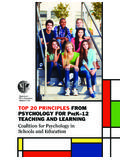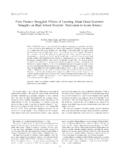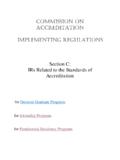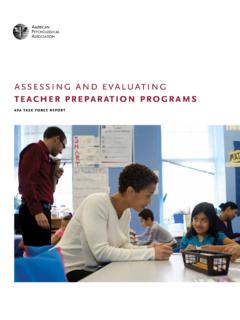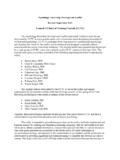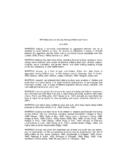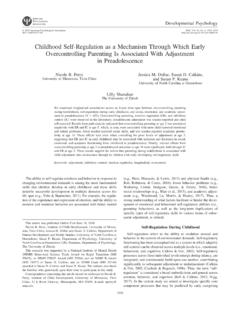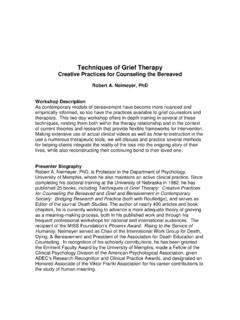Transcription of Journal Article Reporting Standards for Qualitative ...
1 american Psychologist 2018 american psychological association 2018, Vol. 73, No. 1, 26 46. 0003-066X/18/$ Journal Article Reporting Standards for Qualitative Primary, Qualitative Meta-Analytic, and Mixed Methods Research in Psychology: The APA. Publications and Communications Board Task Force Report Heidi M. Levitt Michael Bamberg University of Massachusetts Boston Clark University John W. Creswell David M. Frost University of Michigan Medical School University College London Ruthellen Josselson Carola Su rez-Orozco Fielding Graduate University University of California, Los Angeles The american psychological association Publications and Communications Board Working Group on Journal Article Reporting Standards for Qualitative Research (JARS Qual Working Group) was charged with examining the state of Journal Article Reporting Standards as they applied to Qualitative research and with generating recommendations for Standards that would be appro- priate for a wide range of methods within the discipline of psychology.
2 These Standards describe what should be included in a research report to enable and facilitate the review process. This publication marks a historical moment the first inclusion of Qualitative research in apa style , which is the basis of both the Publication Manual of the american psychological association (APA, 2010) and apa style CENTRAL, an online program to support apa style . In addition to the general JARS Qual guidelines , the Working Group has developed Standards for both quali- tative meta-analysis and mixed methods research. The Reporting Standards were developed for psychological Qualitative research but may hold utility for a broad range of social sciences.
3 They honor a range of Qualitative traditions, methods, and Reporting styles . The Working Group was composed of a group of researchers with backgrounds in varying methods, research topics, and approaches to inquiry. In this Article , they present these Standards and their rationale, and they detail the ways that the Standards differ from the quantitative research Reporting Standards . They describe how the Standards can be used by authors in the process of writing Qualitative research for submission as well as by reviewers and editors in the process of reviewing research. Keywords: Qualitative research methods, Qualitative meta-analysis, Reporting Standards , mixed methods, apa style Historically, apa style , which is the basis for both the Standards and style of research Reporting for psychology as Publication Manual of the american psychological Associ- well as many other social science journals.
4 apa style , ation (hereinafter referred to as the Publication Manual; however, has not included Reporting Standards for qualita- APA, 2010) and apa style CENTRAL, has defined the tive research. As a result, authors preparing reports of Heidi M. Levitt, Department of Psychology, University of Massachusetts Reporting Standards (Working Group). The Working Group thanks Boston; Michael Bamberg, Department of Psychology, Clark University; John the APA Publications and Communications Board, the Society for W. Creswell, Department of Family Medicine, University of Michigan Med- Qualitative Inquiry in Psychology's International Committee, and the ical School; David M.
5 Frost, Department of Social Science, University College Council of Editors for comments and suggestions on a draft of this London; Ruthellen Josselson, School of Psychology, Fielding Graduate Uni- Article . This report was prepared with assistance from Emily Leonard versity; Carola Su rez-Orozco, Graduate School of Education, University of Ayubi and Anne Woodworth. California, Los Angeles. Correspondence concerning this Article should be addressed to Heidi M. Levitt, The authors of this Article are members of the APA Publications Department of Psychology, University of Massachusetts Boston, 100 Morrissey and Communications Board Working Group on Qualitative Research Boulevard, Boston, MA 02466.
6 E-mail: 26. Qualitative RESEARCH Reporting Standards 27. Qualitative and mixed methods research have faced chal- 2004). This turn was poignantly recounted in Danziger's lenges when deciding how to prepare manuscripts for sub- (1979) description of the systematic erasure of Wundt's mission. The american psychological association (APA) cultural psychology tradition (based within introspective Standards often did not make sense for their inquiry tradi- approaches to research) in favor of his psychophysiology tions, methods, or research goals. Similarly, Journal editors laboratory (based within experimental approaches). Al- and reviewers were often confused about how reports though Qualitative methods remained in use after a postposi- should be evaluated.
7 Should they insist that Qualitative tivist approach came into vogue, they were not systematized research articles model the Reporting style and include com- and tended not to be reported as part of the formal inquiry ponents that were helpful for evaluating quantitative re- process within psychology (Wertz, 2014). Over the past search? Given that Qualitative research involves a plurality half-century, however, there has been a gradual revival of of inquiry traditions, methods, and goals, it was uncertain Qualitative methods and a great number of Qualitative meth- how to best adapt the existing Standards . Instead, Standards ods now have been detailed and advanced in the field.
8 Many of Reporting were needed that can be applicable to, and of the methods that have been embraced in psychology have coherent with, diverse Qualitative research methods. had multidisciplinary roots in philosophy, social sciences, The Working Group on Journal Article Reporting Stan- or practice disciplines, such as nursing ( , Giorgi, 2009;. dards for Qualitative Research (JARS Qual Working Glaser & Strauss, 1967). Although Qualitative methods have Group) was formed to develop recommendations to the become accepted in the field, as indicated by their increased APA Publications and Communications Board. Their publication in journals, increased representation in graduate charge was to form recommendations to become the basis coursework and dissertations (Ponterotto, 2005a, 2005c), for journals and publications using apa style .
9 They strove and the retitling of APA Division 5 to Quantitative and to form Reporting Standards that could advance Qualitative Qualitative Methods, many psychologists are still unfamil- research in a way that is sensitive to traditions in the field, iar with these approaches to investigation and continue to while recognizing the complexity of addressing constituen- marginalize them. cies who have quite varied language and assumptions. To be clear, the Standards developed are focused on the act of Reporting that is, they articulate what information should What Are Qualitative Methods? be expected in a manuscript to enable its adequate evalua- The term Qualitative research is used to describe a set of tion.
10 They are an explicit set of criteria for authors to reflect approaches that analyze data in the form of natural language upon in preparing manuscripts and for reviewers to consider ( , words) and expressions of experiences ( , social while evaluating the rigor of a manuscript. They were not interactions and artistic presentations). Researchers tend to developed to act as a primer on Qualitative research tradi- centralize the examination of meanings within an iterative tions, to teach how to design Qualitative research, to de- process of evolving findings typically viewing this pro- scribe the evaluation of rigor, or to articulate the justifica- cess as driven by induction (cf.)
